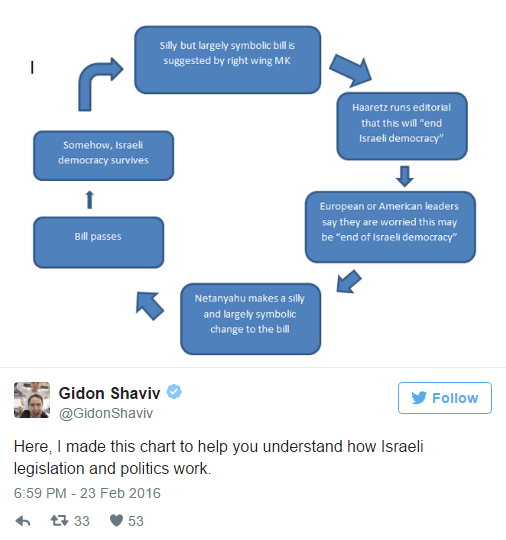The putative ‘erosion’ of Israel’s democracy is one of those NGO and media-driven narratives that has developed into something akin to conventional wisdom among the state’s critics – despite the dearth of any real empirical evidence attesting to such a political decline.
Such erroneous predictions, amplified within both the Israeli and British far-left, sometimes go so far as to predict “the end” of Israeli democracy. Typically, such hyperbolic characterisations are employed in response to ill-advised (proposed) legislation that would never in fact become law – or, at least, end up being significantly watered down, rendering the original concerns practically moot.

On occasion, the polemical prophets even speak of a dark descent into fascism.
Of course, it’s extremely unlikely that more than a few actual Israeli citizens – those intimately familiar with the state’s robust democratic institutions – take such hyperbole seriously. Further, our refutations of such unhinged predictions have typically relied on annual reports by the respected human rights organisation Freedom House, which continue to list Israel as the only “Free” country in the Middle East. Reports by the Israel Democracy Institute also provide detailed comparative analyses on the strength of Israel’s democracy relative to other countries – indicating that, though serious problems do exist, the overall health of the state’s democratic culture is strong.
However, an even more empirically based barometer on the relative strength of Israel’s democracy was recently brought to our attention by Israeli political analyst Guy Bechor – via CAMERA’s Hebrew site Presspectiva.
Bechor noted that the newly released 2016 Democracy Index by The Economist Intelligence Unit (EIU) reported that Israel was the best performer in the MENA region. The Index noted that the country “has worked to strengthen various public institutions—such as the offices of the attorney-general and the accountant-general—to ensure that the government remains accountable to the public between elections”.
Though the report also criticized Israel for what it termed “a huge disparity between the rights enjoyed by its Jewish and Arab citizens”, even more striking than their overall score is the story told by this graph created by Bechor which is based on EIU reports since 2010:
As you can see, whilst some media outlets were predicting the erosion or even demise of Israeli democracy, their overall democracy score has risen dramatically, and is now close to the scores of France and the US.
We have repeatedly argued at this blog that UK media reports on Israel – analyses on society, politics and government – often have little to do with the reality of everyday Israeli life, and serve often to merely reinforce existing prejudices. The EIU Democracy Index clearly suggests that ubiquitous articles and commentaries on the putative instability of Israel’s democratic institutions are among the more egregious examples of this profound journalistic failure.
Originally published at UK Media Watch





